relative clauses คือ อะไร: นี่คือโพสต์ที่เกี่ยวข้องกับหัวข้อนี้
อนุประโยค (Subordinate Clause) คือ กลุ่มคำ (a group of words) ที่มีกิริยาแท้ (Finite Verbs) แต่ไม่มีความหมายสมบูรณ์ในตนเอง
(Incomplete meaning)
เมื่อเป็นกลุ่มคำที่มีกิริยาแท้ (Finite Verb) จะต้องมีผู้แสดงกิริยาหรือประธาน (Subject) และถ้ากิริยาแท้นั้นเป็นสกรรมกิริยา (Transitive Verb) จะมีกรรม (Object) ตามและถ้ากิริยาแท้เป็น Verb to BE หรือกิริยาเทียบเท่า Verb to BE จะต้องมีส่วนสมบูรณ์ของประธาน (Subjective Complement) หรืออาจเป็น Objective Complement แล้วแต่กรณี แต่กลุ่มคำดังกล่าวนี้ไม่มีใจความสมบูรณ์ใน ตัวเอง (Incomplete meaning) จึงไม่สามารถอยู่โดยลำพังกลุ่มคำเดียวได้ จะต้องพึ่งพาอาศัย ส่วนประโยคใหญ่ หรือที่เรียกว่า “มุขยประโยค” (Main Clause) เสมอ ฉะนั้น ส่วนอนุประโยคนี้จะต้องมีตัวเชอม (Relative) เพื่อใช้เกี่ยวติดกับส่วนมุขยประโยคเสมอ แต่บางครั้ง ตัวเชื่อมอาจเป็นประธานของ Clause ก็ได้ จึงต่อด้วยตัวกิริยา (Verb) เลย ดังนั้น ถ้าจะเขียนเป็นสูตรอนุประโยค (Sub. Clause) จะได้ดังนี้
R + (S) + V + (O) หรือ (S.C) หรือ (O.C)
อนุประโยค (Subordinate Clause) แบ่งตามหน้าที่ (Function) ออกเป็น 3 ชนิด เช่นเดียวกับวลี (Phrase) คือ
(1) Noun Clause (2) Adjective Clause (3) Adverb Clause
แต่ก่อนที่จะศึกษา Clause ทั้ง 3 ชนิดโดยละเอียด ขอให้ทำความเข้าใจเกี่ยวกับตัวเชื่อม (Relative) สักเล็กน้อยเพราะถือเป็นตัวสำคัญในการบอก Clause ซึ่งสรุปได้เป็น 2 พวกใหญ่ๆ ดังนี้
1. Question Words 2. Conjunctions
Question Words (คำที่ใช้สร้างคำถาม) นั้นเราได้ศึกษาไปบ้างแล้วในบทที่ 2 ซึ่งทำหน้าที่เป็นตัวที่ใช้สร้างคำถาม (Questions) แต่หน้าที่อีกอย่างหนึ่ง คือ ใช้ทำหน้าที่เป็นตัวเชื่อม (Relative) Clause ได้อีก ซึ่งเราจะศึกษาได้จากการสร้าง Clause ทั้งหลาย
ส่วน Conjunctions (สันธาน) จะกล่าวถึงโดยสังเขปเพื่อใช้ทำความเข้าใจ กล่าวคือ Conjunctions นั้นแบ่งออกเป็น 2 ประเภท ดังนี้
1. Co-ordinating Conj. (Conj. ที่ใช้เชื่อมประโยคต่างๆ ที่มีน้ำหนักทางความหมายเท่ากัน)
2. Subordinating Conj. (Conj. ที่ใช้เชื่อมประโยคที่มีน้ำหนักทางความหมายไม่เท่ากัน)
ฉะนั้น จะเห็นว่า Conj. ที่จะนำมาใช้เป็นตัวเชื่อม (Relative) ใน Clause ก็คือ Subordinating Conj. นั่นเอง ซึ่งแยกเป็น 2 กลุ่ม ดังนี้
1. Sub. Conj. ใช้นำ Noun Clause
2. Sub. Conj. ใช้นำ Adverb Clause
Sub. Conj. ที่ใช้กันบ่อยๆ ที่สุดคือ that, when, where, while, before, after, till, until, it, unless, since, because, (at) though, as
Noun Clause คือ Clause ที่ทำหน้าที่เหมือนคำนาม (Noun) ตัวเชื่อม (Relative) ของมันคือ Question Words ทุกคำ และ that, if, whether (or not) เช่น
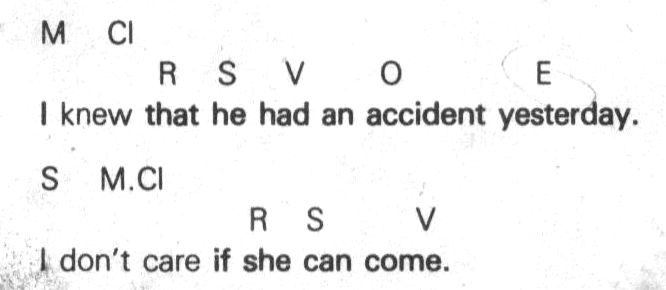
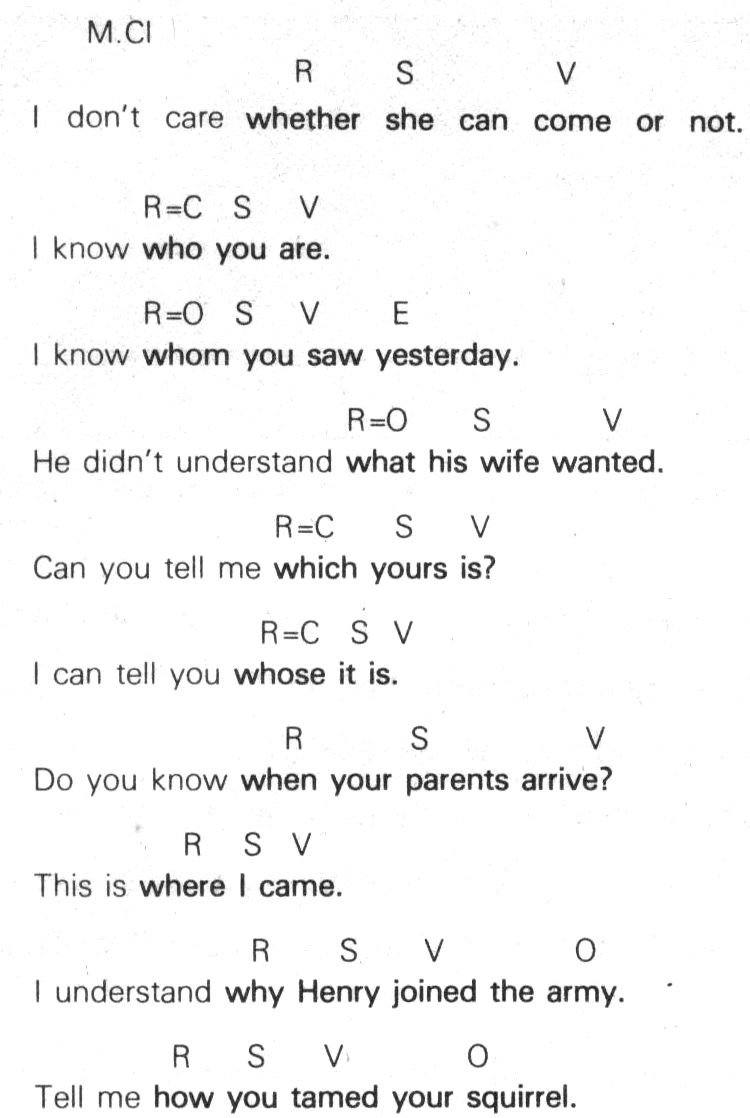
ข้อสังเกต สำหรับ Question Words ทั้งหลายเมื่อใช้เป็นตัวเชื่อม (Relative) ของ Clause แล้ว ยังไม่ทอดทิ้งฐานหน้าเดิมของคำ จะเห็นว่า ถ้าใช้ Question Words ซึ่งมีฐานหน้าที่จากคำสรรพนาม (Pronoun) จะใช้เป็นประธาน (Subject) หรือกรรม (Object) หรือส่วนสมบูรณ์ (Complement) ของ Clause ได้ แต่ถ้าใช้ Question Words
จะใช้เป็น Adverb เท่านั้น
ได้กล่าวแล้วว่า Noun Claues นั้น คือ Clause ที่ทำหน้าที่เหมือนคำนาม (Noun) จึงทำหน้าที่ได้ดังต่อไปนี้
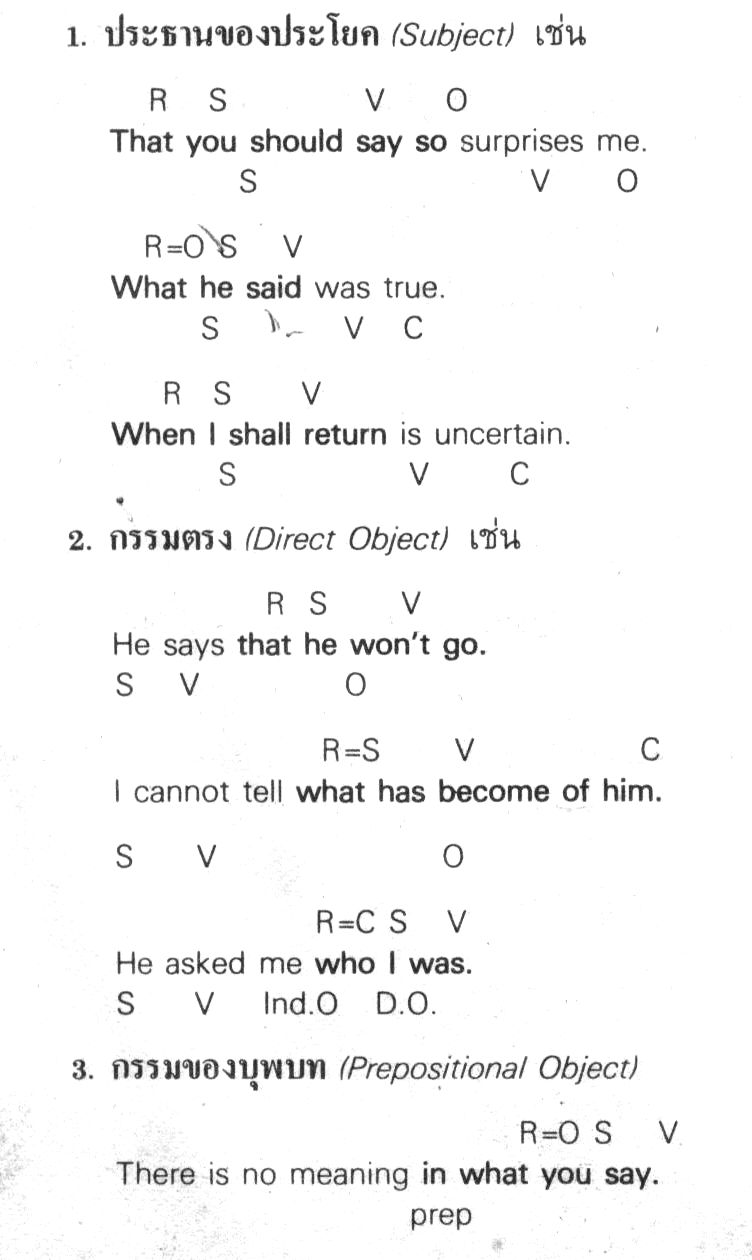
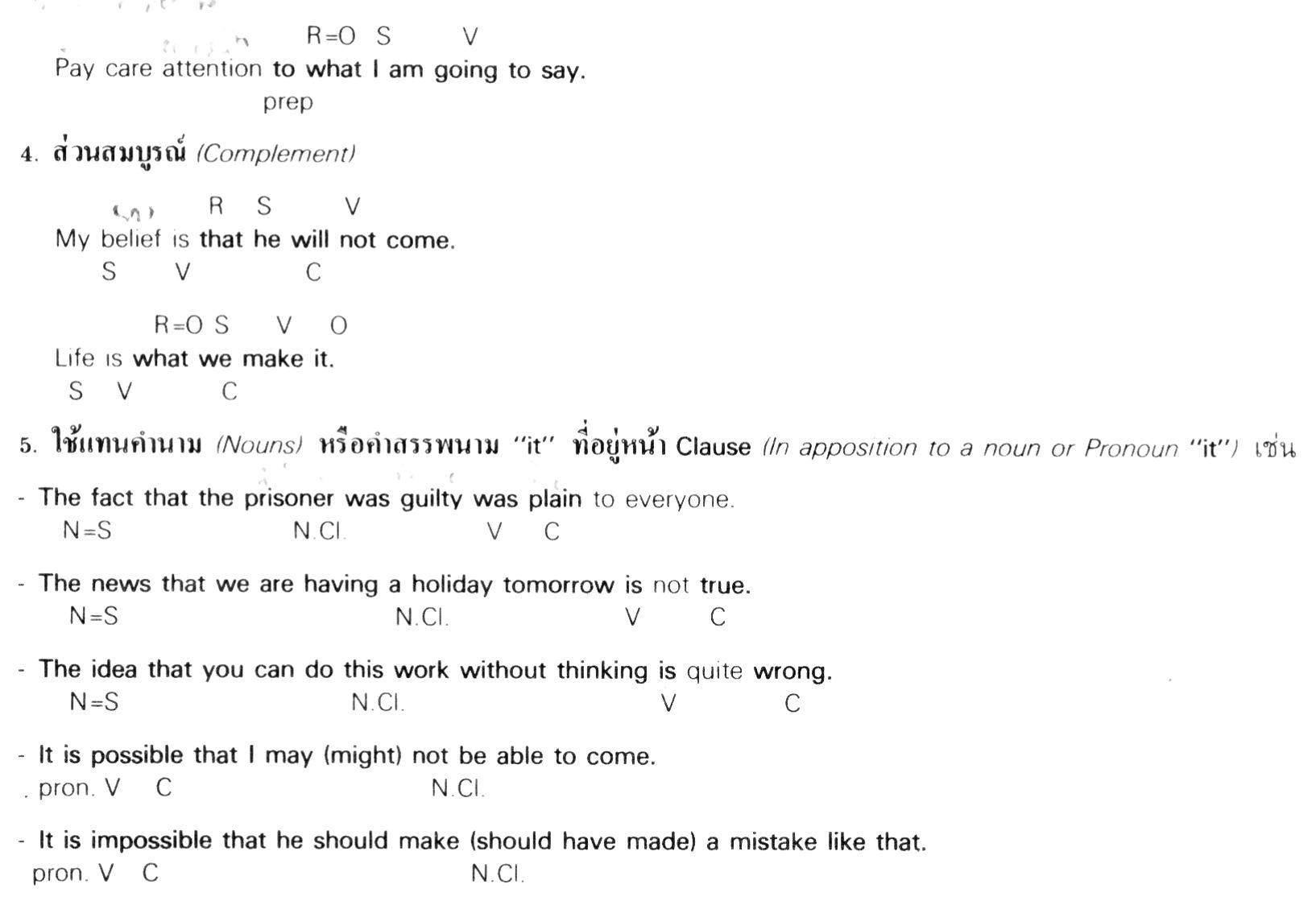
ข้อสังเกต
1. N.CI. ที่ตามหลัง “possible” จะต้องใช้ “may” หรือ “might” ใน Cl. เสมอ
2. N.CI. ที่ตามหลัง “impossible” จะต้องใช้ “should” ใน CI. เสมอ
3. N.CI. ที่ใช้ในลักษณะนี้จะใช้ “that” เป็น Relative
4. ความหมายของ N.CI. คือ สิ่งเดียวกันกับคำนาม (Nouns) ที่อยู่ข้างหน้า ในลักษณะเช่นนี้ขอให้สังเกตให้ดีเพราะอาจจะคิดสับสนไปหาเป็น Adj.Cl.”
5. “It” ที่ใช้ในตัวอย่าง 2 ประโยคสุดท้ายเป็น Impersonal Pronouns
ฉะนั้น จะเขียนประโยค 2 ประโยคนี้ได้อีกลักษณะหนึ่งซึ่งมีความหมายเดียวกันทุกอย่าง คือ
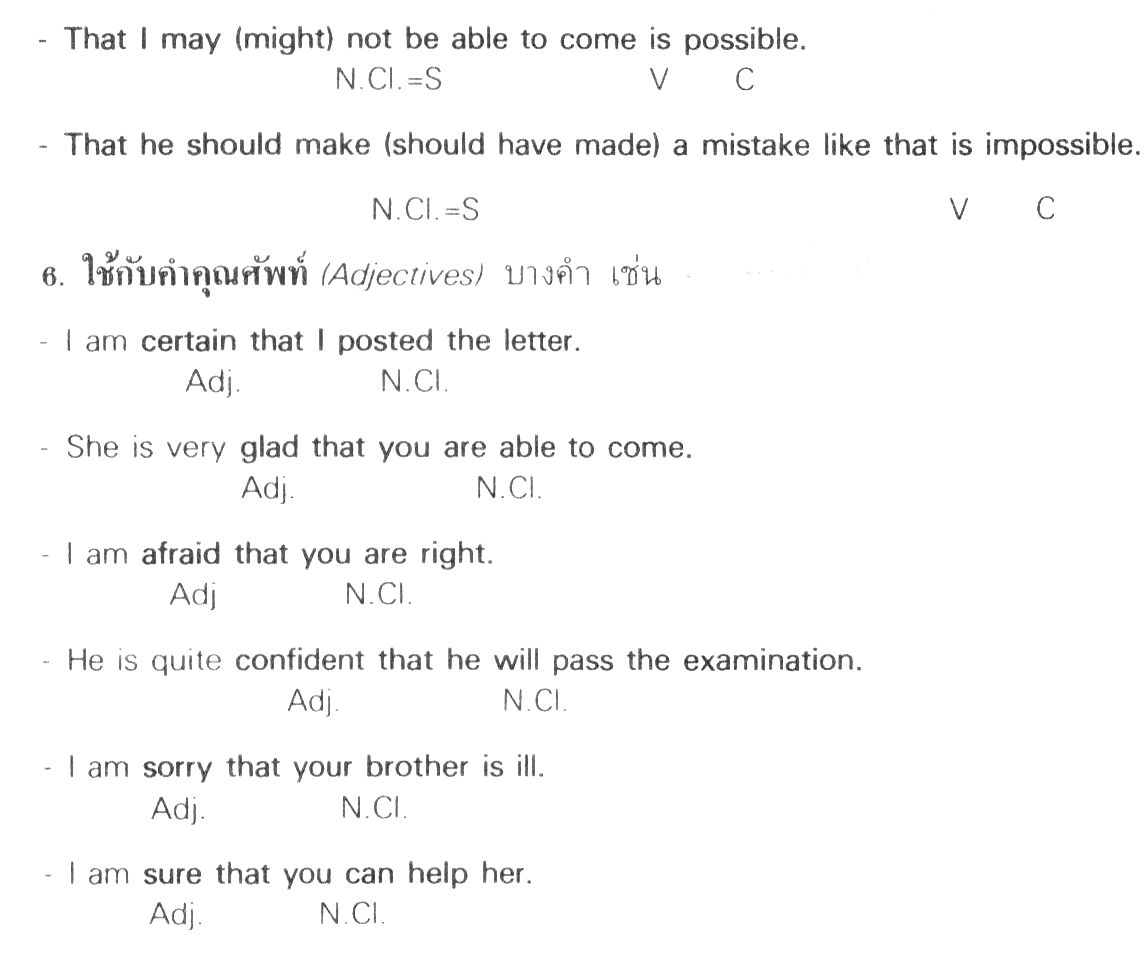
ข้อสังเกต
1. N.CI. ที่ใช้ในลักษณะเช่นนี้ใช้ “that” เป็น Relative เช่นกัน
2. นักไวยากรณ์บางท่านยังไม่เห็นด้วยว่าจะถือเป็น N.CI. เพราะตามหลักไวยากรณ์การวาง Clause นั้น อยู่หลังคำ Adj. เหล่านั้นถือว่า Clause .นั้นจะต้องขยายคำ Adj. นั้นจึงถือว่าเป็น Adv.CI. แต่ถ้าพิจารณาให้ดีแล้วจะเห็นว่า หลังคำ Adj. เหล่านั้น จะต้องมี Preposition ตามหลังอยู่เสมอ เช่น certain of, glad of, afraid of, confident of, sorry for, และ sure of
ฉะนั้น Clause ที่ตามมาข้างหลังจะต้องมีหน้าที่เป็น Prepositional Objects ซึ่งก็คือหน้าที่ของ Noun Clause นั่นเอง
อนึ่งตัวเชื่อม (Relative) ใน Noun Clause อาจละได้ในกรณีที่ตัวเชื่อมนั้นคือ “that” และใช้นำ Noun Clause ที่ทำหน้าที่กรรม (Object) ของ Main Clause หรือนำ Noun Clause ที่ตามหลัง Adjective เช่น
I knew that he did it หรือ I am afraid that you are right.
=I knew he did it.
= I am afraid you are right.
บางครั้งรูป N.CI. อาจเขียนยุบเป็น Infinitive Phrase ได้เมื่อประธานของ M.CI. และประธานของ N.CI. เป็นคนๆ เดียวกัน เช่น
I don’t know what I should do. = I don’t know what to do.
Adjective Clause คือ Clause ที่ทำหน้าที่เหมือนคุณศัพท์ Clause ชนิดนี้มีตัวเชื่อม (Relative) เฉพาะ เพราะคำนาม (Noun) ซึ่งถูก Clause ขยายเรียกว่า “Antecedent” นั้นเป็นตัวกำหนดตัวเชื่อมเอง ดังนี้:-
Antecedent
(คำนามที่ถูก CI. ขยาย)
Function of Relative
(หน้าที่ของตัวเชื่อมใน CI.)
Relative
(ตัวเชื่อมที่ต้องใช้)
คน
S.ของ CI.
Who, that
คน
O ของ CI.
Whom (that)
คน
Prep. O
Prep. Whom, (that)…prep.
คน
Possessive (แสดงความเป็นเจ้าของ)
whose
สัตว์,สิ่งของ
S และ O ของ CI.
Which, that
สัตว์,สิ่งของ
Prep. O
Prep. Which, (that)..prep.
สัตว์,สิ่งของ
Possessive(แสดงความเป็นเจ้าของ)
Of which
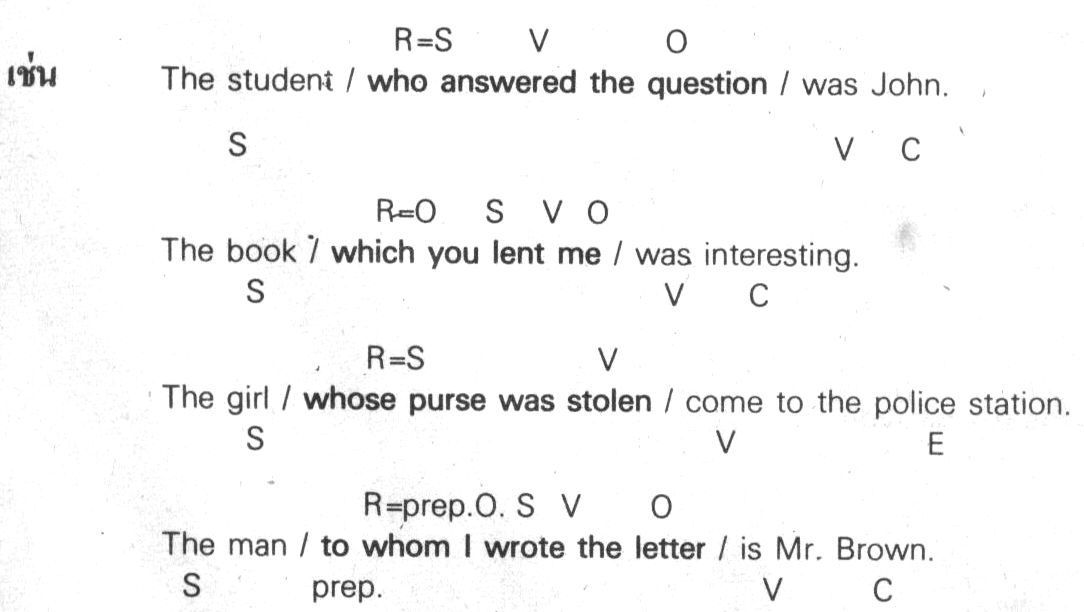
หมายเหตุ
1. Adjective Clause ในกรณีที่ตัวเชื่อมมีหน้าที่เป็นกรรมของบุพบทนั้น สามารถเขียนได้อีกอย่างหนึ่งโดยการวางคำถามตำแหน่งเดิม คือ The man whom I wrote the letter to is Mr. Brown.
2. ตัวเชื่อม (Relative) ทั้งหลายที่กล่าวในตาราง จะเห็นว่า “that” นั้นใช้แทน who, whom, which ได้ แต่ยังมีกฎเพิ่มเติมที่จะต้องใช้ “that” เป็นตัวเชื่อมอย่างเดียวเท่านั้นในกรณีต่อไปนี้:-
1. ในกรณี M.Cl. มีการเปรียบเทียบขั้นสูงสุดอยู่(Superlative Degree) เช่น
She is the most beautiful girl that I have ever seen.
2. เมื่อ Antecedent เป็นคำเหล่านี้ all, any, none, nothing, (the) only Man is the only animal that can talk.
3. ใช้ตามหลัง Question Words “who, what”
Who am I that he should object? What is it that troubles you so much?
4. เมื่อ Ant. มี 2 คำ คำหนึ่งเป็นคน และอีกคำหนึ่งเป็นสัตว์ หรือสิ่งของ เช่น
The boy and his dog that broke into my house were caught this morning.
นอกจากตัวเชื่อม (Relative) ที่แสดงไว้ในตารางแล้ว ยังสามารถใช้ตัวเชื่อมต่อไปนี้
When ถ้า Ant.=Time หรือใช้ at which, on which แทน
When ถ้า Ant.=Place หรือใช้ in which แทน
Why ถ้า Ant.=Reason หรือใช้ for which แทน
How ถ้า Ant.=Method หรือใช้ by which
But = who (which)…..not
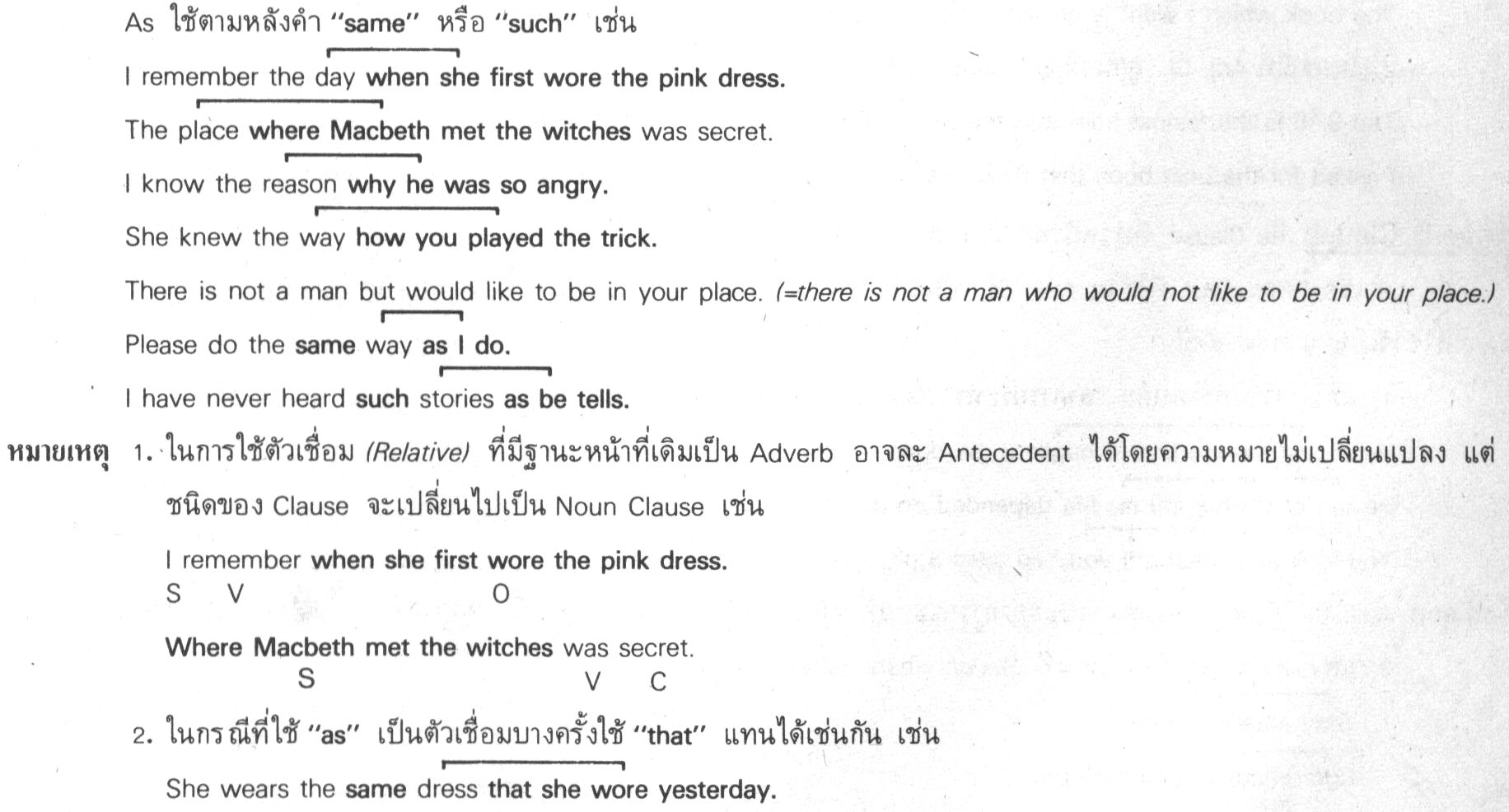
Adjective Clause โดยทั่วไปจะใช้ใน 2 ลักษณะ ดังนี้:-
(1) Defining Clause (2) Non-defining Clause
Defining Clause หมายถึง Clause ที่จำเป็นในการขยาย Antecedent อย่างยิ่ง ซึ่งจะเขียนติดกับ Antecedent เลยโดยไม่ต้องมีเครื่องหมายวรรคตอน (punctuation) คั่น
Non-defining Clause หมายถึง Clause ที่ไม่จำเป็นในการขยาย Antecedent นั้น และในภาษาเขียนจะใช้ comma (,), dash (-)
หรือ parenthesis ( () ) คั่น Clause เสมอ และในภาษาพูดจะหยุด (pause) หน้าเครื่องหมายเหล่านี้
การที่เราจะทราบว่า Adj. Cl. ที่ขยาย Antecedent นั้นจะเป็น Clause ชนิดใดให้สังเกต Antecedent เป็นหลัก ดังนี้
1. ถ้า Antecedent เป็น Common Noun (นามสามัญ) ซึ่งมีความหมายกว้างๆ ยังไม่ชัดเจน ฉะนั้น Adj. Cl. ที่ขยายนั้นถือว่าจำเป็นที่จะต้องให้รายละเอียด Antecedent ตัวนั้นจึงเป็น Defining Clause
2. ถ้า Antecedent เป็น Proper Noun (นามวิสามัญ) ซึ่งมีความหมายชัดเจนในตัวเองอยู่แล้ว เช่น ชื่อคน สัตว์ สถานที่ทั้งหลาย หรืออาจจะเป็น Common Noun ที่มีคำ Adj. ขยายอยู่ข้างหน้าและทำให้เกิดความหมายชี้เฉพาะขึ้น Clause ที่ขยาย Antecedent ประเภทนี้เป็น Non-defining Clause เช่น
Bernard Shaw, who wrote St.Joan, died in 1950.
The Golden Hind – in which Drake sailed round the world – was only a small ship.
That scientist (whose work is very important) has been made a knight.
That scientist (whose work is very important) has been made a knight.
ต้องทำความเข้าใจเกี่ยวกับ Defining Clause และ Non-defining Clause ให้ดี เพราะถ้าใช้ผิดพลาดไปแล้วอาจก่อให้เกิดความเข้าใจสับสนได้ เช่น
All the books, which had pictures in them, were sent to the little girl. (= เด็กหญิงเล็ก ๆ นั้นได้รับหนังสือทุกเล่ม)
All the books which had pictures in them were sent the little girl. (=เด็กหญิงเล็กๆ ได้รับหนังสือที่มีภาพเท่านั้น)
He has a brother, who is an artist. (= เขามีพี่เพียงคนเดียวและพี่ของเขาเป็นศิลปิน)
He has a brother who is an artist. (= เขามีพี่หลายคนแต่คนหนึ่งเป็นศิลปิน)
อนึ่ง ตัวเชื่อม (Relative) ใน Adj. Cl. อาจละได้ในกรณีต่อไปนี้
1. เมื่อ Relative นั้นทำหน้าที่เป็นกรรม (Object) ภายใน Clause เช่น

2. ในกรณีที่ Adj. Cl. ถูกนำด้วย “there + BE” เช่น
The 9:15 is the fastest train that there is to Oxford. = The 9:15 is the fastest train there is to Oxford.
I asked for the best book that there was on the subject. = I asked for the best book there was on the subject.
Adverb Clause คือ Clause ที่ทำหน้าที่เหมือนกับ Adverb
ตัวเชื่อม (Relative) ที่ใช้ใน Adv. Cl. นั้นมีมากมาย มากกว่าที่ใช้ใน Clause ทั้ง 2 ชนิดที่กล่าวมาแล้ว ซึ่งจำแนกตามความหมายที่ใช้ไว้เป็น 9 กลุ่ม ดังนี้

ข้อสังเกต Adv. Cl. ที่แสดงความหมายบอกอาการกระทำที่ใช้กับ as if หรือ as though นั้น จะตามด้วยรูป “Past Subjunctive”

I learned a lot of French while I was in Paris.
She learned English before she came to England.
He kept on with his work until he had finished it.
The thief was arrested as he was leaving the bank.
4. แสดงความหมายเกี่ยวกับ “เหตุผล” (Cause & Reason): because, since, as, seeing that, now that เช่น
Since/as/seeing that/now that you won’t help me, I must do the job myself.
He sold the car because it was too small.
ข้อสังเกต
1. Adv. Cl. ที่นำด้วย “as, since, seeing that และ now that” จะต้องวางไว้หน้า Main Clause เสมอ แต่ถ้านำด้วย “because” จะวางไว้หลัง Main Clause
2. เพื่อใช้ในความหมายเน้น (Emphasis) จะถูกนำด้วย it is, it was แล้วตามด้วย “that” เช่น
It was (only) because the car was so small that he sold it.
5. แสดงความหมายขัดแย้งกัน (Concession)-, though, although, even though, even if, whenever, however, as, whether… or not, no matter whether…or not, for all that เช่น
Though (although) he tried hard, he was not successful.
For all that he tried hard, he was………………………….
Whether he tried hard or not, he was…………………….
Whenever he tried hard, he was………………………….
However hard he tried, he was…………………………..
Hard as he tried, he was
ข้อสังเกต Relative ที่แสดงความหมายขัดแย้ง (Concession) ทุกตัว ยกเว้น however และ as จะมีโครงสร้างของประโยคตามปกติ แต่ถ้าใช้ “however” และ “as” ในความหมายขัดแย้งจะต้องวางโครงสร้างตามตัวอย่างเท่านั้น มิฉะนั้นจะมีความหมายเป็นอย่างอื่น
6. แสดงความหมายการเปรียบเทียบ (Comparison): as..as, so….as, such (a)…..as และ than และ the more…. The more…. เช่น
This work is as easy as you think.
I can not run so fast as you used to do.
That question was not such an easy one as I thought.
I used to love you more than he does now.
The more you work, the more you earn.
The more you eat, the bigger you become.
ข้อสังเกต
1. as…as, so…as สามารถใส่คำ Adjective, Adverb ไว้ในช่องว่าง’
2. such (a)…as ต้องมี Adj.+N ในช่องว่าง
3. “as….as” มักใช้กับประโยคบอกเล่า ส่วน so…as มักใช้กับประโยคปฏิเสธ
4. “than” ใช้กับการเปรียบเทียบขั้นกว่า (Comparative Degree)
5. “more” เป็นสัญลักษณ์แสดงการเปรียบเทียบขั้นกว่า (Comparative Degree) เท่านั้น
7. แสดงความหมาย “เงื่อนไข” (Condition): if, unless (if…not), whether, as long as, supposing that, provided (that), on the condition that เช่น
I shall go if he asks me.
I shan’t go unless he asks me.
หมายเหตุ ให้ดูรายละเอียดในเรื่องประโยคเงื่อนไข (Conditional Sentence หรือ IF Clause)
8 แสดงความหมายบอกวัตถุประสงค์ (Purpose)-, so that, in order that, lest (= for fear that, so that…not) เช่น
Some people eat so that they may live.
Others seem to live in order that they may eat.
I am telling you this lest you should make a mistake.
ข้อสังเกต Adv. Cl. ที่แสดง Purpose นี้จะใช้ may, might, shall หรือ should ใน Clause ด้วยเสมอ เพราะแสดงความหมาย “เพียงอาจจะเป็นเท่านั้น”
9. แสดงความหมายบอกผลลัพธ์ (Result): so that, so…that, such (a)…that เช่น
I received my wages yesterday so that I can pay what I owe you.
He ran so fast that I could not catch him.
It was such a warm day that I take off my jacket.
ข้อสังเกต Adv. Cl. ที่แสดง Result นั้น นำด้วย Relative (บางคำ) เป็นชุดเดียวกับแสดง Purpose แต่ภายใน Clause จะแสดงด้วย “can, could” หรือเป็นประโยคที่แสดงความแน่นอน (Certainty)
จากตัวอย่างของ Adv. Cl. ทั้ง 9 ชุดที่แสดงให้ดูนั้น จะเห็นว่ามีการเขียนได้ 2 แบบ คือ
1. Main Clause + Subordinate Clause
ซึ่งไม่ต้องใช้ Comma (,) คั่นเลย เพราะเชื่อมด้วย Relative แล้ว
2. Subordinate Clause , Main Clause
ในกรณีเช่นนี้จะมีความหมายเป็น (Emphasis) ขึ้น และต้องใช้ Comma (,) เชื่อมเสมอ
และในกรณีที่นำ Subordinate Clause วางไว้หน้า Main Clause (ในรูปแบบที่ 2) นี้ จะพบในงานเขียนทั่วไปว่ามิได้เขียนแสดงด้วยโครงสร้าง Clause ก็มี แต่จะแสดงโครงสร้างในรูปวลี (Phrase) ที่มี Relative นำ ซึ่งเรียกว่า “อนุประโยคย่อ” (Abbreviated Clause) จะทำได้ในกรณีต่อไปนี้
1. เป็น Adverb Clause ทีแสดง Concession เช่น
Though he was beaten, he was not disgraced. = Though beaten, he was not disgraced.
2. เป็น Adverb Clause แสดง Time ในกรณีที่นำด้วย Relative “when, while, till, until, whether…or” เช่น
While he was walking in the park, he sprained his foot. = While walking in the park, he sprained his foot.
Whether it is right or wrong, his opinion does not concern me = Whether (being) right or wrong, his opinion does not concern me.
3. เป็น Adverb Clause แสดง Condition เช่น
If you take this medicine regularly, you will be better. = If taking this medicine regularly, you will be better.
ข้อสังเกต
1. Adv. Cl. ที่แสดง Concession, Time และ Condition จะทำ Abbreviated Clause ได้นั้น จะต้องมีประธาน (Subject) ใน Subordinate Clause และประธาน (Subject) ใน Main Clause เป็นคนๆ เดียวกัน
2. รูป Clause ที่ยุบไปจะกลายเป็นรูป Phrase ชนิด Participial Phrase เสมอ
ที่มา:อาจารย์ชำนาญ ศุภนิตย์, ดร.สัญญา จัตตานนท์, อาจารย์สุทิน พูลสวัสดิ์
Table of Contents
[NEW] 1 | relative clauses คือ อะไร – NATAVIGUIDES
Complex
Sentences
��ͻ���¤����Сͺ���»���¤��ѡ
(main clause) �Ѻػ���¤ (subordinate
clause) ����������ö���������Ӿѧ
���ͧ����»���¤��ѡ����
ػ���¤�
complex sentences ����ö��ṡ�͡�� 3 ���������
1) adjective clauses
(relative clause)
2) noun
clauses
3) adverb
clauses
1. Adjective
Clauses (Relative Clauses)���ػ���¤����˹�ҷ�������Ӥس�Ѿ��
��͢��¤ӹ�� ���Ҩ����Фӹ����������������������������ǡѺ�ӹ�����
adjective clauses ������Ѻ����¤��ѡ���� relative pronoun (�� who,
whom, whose, + whom, which, of which, +
which, that) ��� relative adverb (�� where,
when, why) ��觷�˹�ҷ���иҹ ���� ������ǹ����� adjective
clause ����
adjective
clauses �Ҩ���͡�� 3 ���������
1.1 �繻���¤�س�Ѿ�������Фӹ�����١����
�ҡ����ջ���¤�س�Ѿ�����й�����
��з����ӹ��㹻���¤��ѡ�դ��������ա���ҧ˹�� ��
Students
who get grade A in all subjects will be sent for special training in the
U.S.
[ػ���¤ who get grade A in all subjects �� restrictive
relative clause ���������ҹѡ���¹������ͺ���ô A �ء�Ԫ� (����Ǥ�� �����ѡ���¹�ء��) �ж١�������Ѻ���ͺ������ɷ���������Ѱ����ԡ�
����ҡ����ջ���¤�س�Ѿ�����й����¤ӹ�� students ��еդ������������ ���¶֧�ѡ���¹�ء��]
People
who do such silly things are fools.
[ػ���¤ who do such silly things �� restrictive
relative clause ���������Ҥ��������������� ��� �
Ẻ��� (����Ǥ��
����褹�ء��) �繤��� �һѭ��
����ҡ����ջ���¤�س�Ѿ�����й����¤ӹ�� people ��еդ������������
���¶֧���ء��]
Tell me the
reason why you didn�t
do your homework.
[ػ���¤ why you didn�t
do your homework �� restrictive relative clause ������� �˵ؼ���ҷ����س�֧���ӡ�ú�ҹ (����Ǥ��
������˵ؼ�����ͧ㴡���) ����ҡ����ջ���¤�س�Ѿ�����й����¤ӹ�� reason ���Ҩ�դ������������ ���¶֧�˵ؼ�����ͧ㴡��� �����˵ؼ���� � ]
1.2 �繻���¤�س�Ѿ�����������������������ǡѺ�ӹ�������� ���������
�����������������¢ͧ����¤��ѡ�Դ�
��
Soonthorn
Phu, who wrote �Phra
Aphaimanee,�
was one of the most famous poets in Thailand.
[ػ���¤ who wrote �Phra
Aphaimanee� �� non-restrictive relative clause ���������������������
�ع���������繤����������ͧ���������� ��������բ�ͤ���������������� ������ö������ç�ѹ������¶֧�ع�����
����͡�ͧ��]
Her
parents, who left her with her grandmother, came back.
[ػ���¤ who left her with her grandmother �� non-restrictive
relative clause ��������������������� ������ͧ����觷�������Ѻ��� ��������բ�ͤ���������������� ������ö������ç�ѹ������¶֧
������ͧ�� (����褹���) ��Ѻ������]
�������㨤���ᵡ��ҧ�����ҧ
��� �ҡ��觢�� ��������º��º������ҧ����������Ф��
���仹��
The
l (whom) Suchart is going to marry is over twenty-five.
,
whom Suchart is going to marry, is over
twenty-five.
The
which runs through Bangkok is now polluted.
,
which runs through Bangkok, is now
polluted.
He
works at where radios are produced.
He
works at , where radios are produced.
They
visited me when I did not go to work.
They
visited me , when I did not go to work.
1.3 �繻���¤�س�Ѿ������������ which
��������᷹�Фӹ������Ң�ҧ˹��
����᷹����¤���͢�ͤ�������Ң�ҧ˹�ҷ����� which ����˹�ҷ���繻�иҹ
�����ç ���͡��������ѧ�ؾ��� adjective clauses �¨��� comma
��������ҧ��ͤ����á�Ѻ��ͤ�����ѧ ��
He is a kind,
gentle, and well-behaved person, which made his parents very proud of him.
She came very
late, with which I was very dissatisfied.
She
considered them all fools, to which they replied with angry cries.
2. Noun
Clauses���ػ���¤����˹�ҷ�������Ӥӹ��
����������͡Ѻ����¤��ѡ���¤���������仹����
2.1 ��˹�һ���¤�͡����
����Ҩ���¡ noun clause ��Դ������ �that�
clause ��觷�˹�ҷ�����������ҧ㹻���¤ �� �� subject,
object, complement ���
apposition �ѧ������ҧ���仹��
That he failed the final exam .
Subj.
Predicate
I know that she will arrive here tonight.
Subj. V.
Obj.
His excuse was that the traffic jam was so congested.
Subj. V.
Complement
She made the announcement that they were married.
Subj. V.
Obj.
Apposition
����¤�����
noun clause �� subject ����ö����¹�繻���¤����鹵鹴���
�It� �� �ѧ������ҧ���仹��
That he
passed the course .
Subj,
Predicate
It is a miracle that he passed the
course.
2.2 ���� what, whatever, who, whoever,
whom, whomever, whose, which, whichever, where, when, why ��� how ��觤����Фӡ��դ�����������Ըա����ᵡ��ҧ�ѹ�͡� �ѧ������ҧ���仹��
Tell me what
your name is.
John told me who
rang me yesterday.
I don�t like whomever he goes out with.
Could you
tell me whose car this is?
You can take whichever
you like.
She told me where
I should buy a diamond ring.
He wanted to
know when Ploy would come back from Ireland.
I don�t understand why Paul and Jenny
broke up.
How you won
the scholarship was a bit surprising to me.
2.3 ���˹�� noun
clause 㹤���������� ��������� �ѧ������ҧ���仹��
Whether Nancy
will come here (or not) is not important.
Do you know whether
/ if John is coming here again this year?
3. Adverb
Clauses��ػ���¤����˹�ҷ�������ӡ��������ɳ�
��͢��¤ӡ���� �Ӥس�Ѿ�� ��Фӡ��������ɳ�㹻���¤��ѡ
�����ʴ���������ѹ�������ҧ��ͤ���㹻���¤��ѡ�Ѻػ���¤��������ѡɳ�� �� �͡�������ҡ�� (manner)
ʶҹ��� (place) ���� (time) �˵ؼ� (reason) �ѵ�ػ��ʧ�� (purpose) �Ţͧ��á�з� (result) ��âѴ��駡ѹ (concession/contrast)
������º��º (comparison) ���� (condition)
�繵� �ѧ������ҧ���仹��
·
�͡�������ҡ��
(manner) ����
ػ���¤����� as, in a way that, in the way that, like, as if, as
though
She always
practices conversation with English speaking people as her teacher told her
to.
She
dances in a way that I like.
She speaks
English as if she were a native speaker.
He acts as
though he were my boss.
·
�͡ʶҹ���
(place) ���� ػ���¤����� where, wherever
Put this book
where it belongs.
Wherever you
go in Bangkok, you can find places to eat.
·
�͡����
(time) ����
ػ���¤����� as, while, as soon as, before, after, since, until,
when, whenever
While he was
studying, his sister was listening to
classical music.
When I was
young, I loved to go to the temple fair.
I will call
you as soon as I finish.
·
�͡�˵ؼ�
(reason) ����
ػ���¤����� because, since, as
Some of us
study English because it may help us get a good job.
Since Jane
was not a Thai citizen, she could not apply for
the scholarship.
As English is
one of the international languages, it is
worthwhile to spend time studying it.
·
�͡�ѵ�ػ��ʧ��
(purpose) ����
ػ���¤����� in order
that, so that
We took a sky
train (BTS) to Silom so that we could get there in time.
She takes a
writing class in order that she can write well.
·
�͡�Ţͧ��á�з�
(result) ��
ػ���¤����� so, so (adj./adv.) that
She has
failed the English test many times, so she plans to get a tutor.
Ann speaks so
clearly that every student understands very well.
·
�͡��âѴ��駡ѹ
(concession/contrast) ����
ػ���¤����� while,
whereas, although, though, even though
Kim wants to
go to Hua Hin her husband wants to go to Phuket.
he is only 10 years old,
he understands calculus very well.
·
�͡������º��º
(comparison) ����
ػ���¤�������ʴ�������º��º������������ҡѹ �ҡ���������¡���
Michael is taller
than David (is).
Pim sings more
beautifully than Prang (does).
Dao does not
speak Italian as fast as a native speaker (does).
·
�͡����
(condition) ����
ػ���¤����� if, unless (= if �
not)
If you
blue and yellow, you green. (�����䢷���繢���稨�ԧ����)
If Mr. Smith
me to his party himself, I . (�����䢻��Է�������)
Unless I
my work, I to the party. (�����䢻��Է�������)
If I
a bird, I all over the sky.
(�����䢷��������������������ҡ)
If he me yesterday, I
the party. (�����䢷��ç�����Ѻ����稨�ԧ�ʹյ)
Relative Clauses: The Grammar Gameshow Episode 11
Welcome to the Grammar Gameshow! Test your knowledge in this crazy quiz! The presenter is a bit strange, the points don’t make sense and the prizes could use some improvement, but at least the grammar is correct!
Levington already has one win under his belt, but Kate is hard on his heels. In this episode, our contestants test themselves against defining relative clauses! Those useful, noun modifying phrases that make complex sentences! Will Levington win through, or can Kate take him down? And what’s this big surprise at the end? Find out in this episode of the Grammar Gameshow!
Watch and see! Learn more here: http://www.bbc.co.uk/learningenglish/english/course/tgg/
Do you want to learn how to speak English? Then join us here on YouTube for great grammar, drama, news, study, pronunciation, vocabulary, music, interviews and celebrity videos. Every day we have a new video to help you with English. We also produce regular ‘extra’ videos across the week so come back every day to see what’s new.
MONDAY: The English We Speak
TUESDAY: News Review
TUESDAY: English At Work
WEDNESDAY: The Grammar Gameshow and LingoHack
THURSDAY: 6 Minute English
FRIDAY: The Experiment (watch this space for new and exciting content that we are trying out!)
For more videos and content that will help you learn English, visit our website: http://www.bbclearningenglish.com
นอกจากการดูบทความนี้แล้ว คุณยังสามารถดูข้อมูลที่เป็นประโยชน์อื่นๆ อีกมากมายที่เราให้ไว้ที่นี่: ดูความรู้เพิ่มเติมที่นี่

Chuyên đề: MỆNH ĐỀ QUAN HỆ( sách 25 chuyên đề)
►Đăng Ký theo dõi (Subscribe): https://goo.gl/PGHQeq
► Trang web: http://mrstranganh.edu.vn/
Liên hệ:
► Facebook cô Trang Anh: https://goo.gl/PJXUgE
►Fanpage học Tiếng Anh: https://goo.gl/TQ9hV8
►Cảm ơn đã xem video của tôi.
© Bản quyền thuộc về Trang Anh English
© Copyright by Trang Anh English ☞ Do not Reup

ติว TOEIC ครูดิว : Relative Pronouns ที่ออกสอบ TOEIC บ่อยที่สุด !!!!
✿ ถ้าพื้นฐานน้อย แนะนำหาคอร์สติวดีกว่าค่ะ! ✿
👉 สมัครคอร์ส KruDew ติว New TOEIC 2020 (ทดลองติวฟรี!) ➡️ https://bit.ly/2wR4Gmu
✿ คอร์ส KruDew ติว TOEIC มีอะไรให้บ้าง? ✿
✅Grammar ที่ใช้สอบ TOEIC ให้ครบ เริ่มสอนจากพื้นฐาน เรียนได้ทุกคนแน่นอน
✅เทคนิคช่วยจำต่างๆ จำง่าย เอาไปใช้กับข้อสอบได้จริงๆ
✅เก็งศัพท์ TOEIC ออกข้อสอบบ่อยๆ ให้ครบ ไม่ต้องเสียเวลาไปนั่งรวบรวมเอง
✅ อัพเดทข้อสอบ New TOEIC ล่าสุด ครบ 200 ข้อ
✅สามารถสอบถามข้อหรือจุดที่สงสัยได้ตลอด
✅การันตี 750+ (ถ้าสอบแล้วไม่ถึง สามารถทวนคอร์สได้ฟรี)
📣 ถ้าไม่อยากพลาดคลิปดีๆแบบนี้ อย่าลืมกด ❤️ Subscribe ❤️กันนะคะ

participle คืออะไร เชื่อมประโยค relative clause ลดรูป เรียนอังกฤษกับ ดร.พี่นุ้ย
ตัด who, which, that ออก
เรียนภาษาอังกฤษ
ดร.พี่นุ้ย สมิตา หมวดทอง
โรงเรียนสอนภาษาอังกฤษ NuiEnglish
เกียรตินิยมอันดับ 1 อักษร จุฬาฯ
นักเรียนทุน ก.พ. และทุนรัฐบาลอังกฤษ
พสบ. 26 กองทัพบก
พขส.2 สถาบันพระปกเกล้า
FA 7 สถาบันพระปกเกล้า
พคบ.10 กอ.รมน
กรรมการสงเคราะห์ สถานพินิจสมุทรสาคร
The Startup Ready Batch3
SIP 44 ธนาคารกรุงเทพ
http://www.nuienglish.com
http://www.facebook.com/nuienglish

who whom whose which that ใช้ยังไง | ติว Tuesday
who whom whose which that ใช้ยังไง | ติว Tuesday by เรียนเหอะ อยากสอน
ติว Tuesday วันนี้ครูอายจะมาสอนการเลือกใช้ who whom which that whoseใช้ยังไง
who whom whose ใช้ยังไง
who whom ใช้กับคน
which ใช้กับสิ่งของ
whose ใช้แสดงความเป็นเจ้าของ
ใช้ that แทน who whom which ตอนไหนได้บ้าง
ละ relative pronoun ตอนไหนได้บ้าง
ประเภทของ relative clause ได้แก่
1. defining relative clause
2. nondefining relative clause
เจอกันกับ ติว Tuesday ทุกวันอังคาร
และ พักกลางวัน ทุกวันศุกร์นะคะ
เรียนภาษาอังกฤษด้วยตัวเองฟรี กับครูอาย เรียนเหอะ อยากสอน ได้ที่ไหนบ้าง?
▸ Youtube : https://www.youtube.com/เรียนเหอะอยากสอน
▸ Facebook : https://www.facebook.com/reanher
▸ Instagram : https://www.instagram.com/reanher.ig
กดที่นี่เพื่อ Subscribe ช่องนี้กันได้นะคะ ^^
https://www.youtube.com/channel/UCRX0VwKduaOHqlGeIdeOAUg?sub_confirmation=1
ติดต่อสปอนเซอร์
▸ Email : [email protected]
ครูอาย สอนภาษาอังกฤษ เรียนเหอะอยากสอน ติวTuesday

นอกจากการดูบทความนี้แล้ว คุณยังสามารถดูข้อมูลที่เป็นประโยชน์อื่นๆ อีกมากมายที่เราให้ไว้ที่นี่: ดูวิธีอื่นๆLEARN FOREIGN LANGUAGE
ขอบคุณที่รับชมกระทู้ครับ relative clauses คือ อะไร